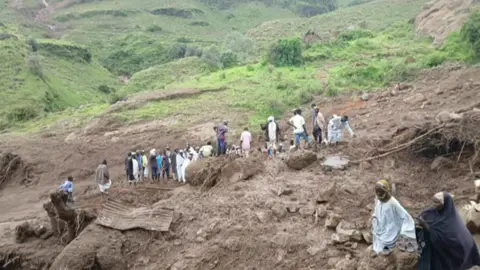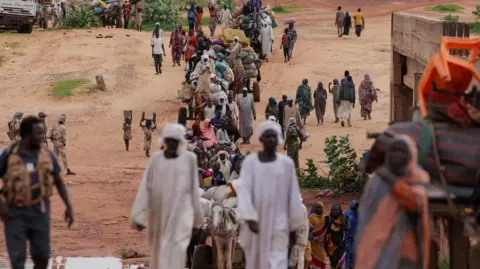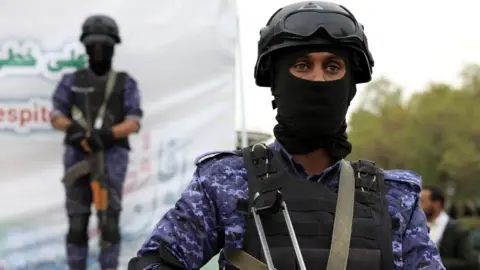Reem al-Kari and her cousin Lama are searching through dozens of photos of children spread out on a desk. Lama thinks she spots one with a likeness to Karim, Reem's missing son.
Karim was two-and-a-half when he and his father disappeared, in 2013 during Syria's civil war, as they ran an errand. He is one of more than 3,700 children still missing since the fall, 10 months ago, of the Assad dictatorship. He would now be 15.
'Are his eyes green?' asks the man behind the desk, the new manager of Lahan Al Hayat, a Syrian-run children's shelter which former first lady Asma al-Assad helped establish in 2013. He is looking at one of the photos the women have picked out, comparing it to a photo of Karim aged two. 'Yes,' comes the reply. 'The hairline…' the man muses. 'There is a similarity but…' His voice trails off. The task is enormous.
Lahan Al Hayat is one of several Syrian childcare facilities which were used to hold the children of detained parents during the 2011-2024 civil war. Instead of re-homing the children with their relatives, the youngsters were held in orphanages and used as political pawns. In some cases the children were falsely recorded as orphans, or their identities changed, making tracing them - then and now - all the more difficult.
When Assad's dictatorship suddenly collapsed in December, journalists, activists and families had access to sources, locations and documents previously unimaginable under his decades-long rule. The BBC World Service has worked with investigative media organisation Lighthouse Reports and five other outlets, to build a database of 323 children hidden by the Syrian regime from their relatives in a network of orphanages. We did this by reviewing and authenticating thousands of leaked and gathered documents.
Analysis of these records shows the organisation running orphanages which took more children than any other was an Austria-headquartered charity, SOS Children's Villages International. SOS operates in more than 130 countries and raises about €1.6bn ($1.9bn) a year, including from the UN, European governments and personal donations.
We spoke to more than 50 SOS whistleblowers. Several said most of the senior positions at SOS in Syria had been appointed directly by the Assad palace, and that Asma al-Assad - who, along with her husband Bashar, was sanctioned by the EU and the UK for human rights abuses - had an influential role in the organisation. We were also told that the charity began 'bringing in any child' regardless of their circumstances to obtain more funding.
SOS responded: 'We do not offer financial rewards for increasing the number of orphans,' and denied any formal link between the charity and the Assad family.
The charity has already admitted that 140 children without proper documentation were taken in by SOS Syria between 2013 and 2018. It has stated that it stopped receiving children of political detainees in 2018, but there are indications that their transfer to the charity continued. The investigation has brought to light the multi-layered complexities surrounding these disappearances, challenging the narratives of humanitarian intervention by international organizations like SOS Children's Villages.
Karim was two-and-a-half when he and his father disappeared, in 2013 during Syria's civil war, as they ran an errand. He is one of more than 3,700 children still missing since the fall, 10 months ago, of the Assad dictatorship. He would now be 15.
'Are his eyes green?' asks the man behind the desk, the new manager of Lahan Al Hayat, a Syrian-run children's shelter which former first lady Asma al-Assad helped establish in 2013. He is looking at one of the photos the women have picked out, comparing it to a photo of Karim aged two. 'Yes,' comes the reply. 'The hairline…' the man muses. 'There is a similarity but…' His voice trails off. The task is enormous.
Lahan Al Hayat is one of several Syrian childcare facilities which were used to hold the children of detained parents during the 2011-2024 civil war. Instead of re-homing the children with their relatives, the youngsters were held in orphanages and used as political pawns. In some cases the children were falsely recorded as orphans, or their identities changed, making tracing them - then and now - all the more difficult.
When Assad's dictatorship suddenly collapsed in December, journalists, activists and families had access to sources, locations and documents previously unimaginable under his decades-long rule. The BBC World Service has worked with investigative media organisation Lighthouse Reports and five other outlets, to build a database of 323 children hidden by the Syrian regime from their relatives in a network of orphanages. We did this by reviewing and authenticating thousands of leaked and gathered documents.
Analysis of these records shows the organisation running orphanages which took more children than any other was an Austria-headquartered charity, SOS Children's Villages International. SOS operates in more than 130 countries and raises about €1.6bn ($1.9bn) a year, including from the UN, European governments and personal donations.
We spoke to more than 50 SOS whistleblowers. Several said most of the senior positions at SOS in Syria had been appointed directly by the Assad palace, and that Asma al-Assad - who, along with her husband Bashar, was sanctioned by the EU and the UK for human rights abuses - had an influential role in the organisation. We were also told that the charity began 'bringing in any child' regardless of their circumstances to obtain more funding.
SOS responded: 'We do not offer financial rewards for increasing the number of orphans,' and denied any formal link between the charity and the Assad family.
The charity has already admitted that 140 children without proper documentation were taken in by SOS Syria between 2013 and 2018. It has stated that it stopped receiving children of political detainees in 2018, but there are indications that their transfer to the charity continued. The investigation has brought to light the multi-layered complexities surrounding these disappearances, challenging the narratives of humanitarian intervention by international organizations like SOS Children's Villages.

















